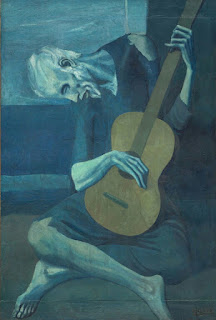Given that language teachers have a background in linguistics and, presumably, a love of language, it is easy for them to forget what an additional burden learning these concepts and the Spanish nomenclature (verbo conjugado, etc.) is for the beginner.
Fortunately I share their fascination with grammar and, armed with knowledge of a couple of other foreign languages, many of the concepts are familiar to me. However, others in the class are rightly baffled when asked to conjugate an irregular reflexive verb into the third person plural.
The theme of language as a determining factor in how one interprets the world, constructs a mental model of it, and ultimately interacts with it, continued in the afternoon. My teacher introduced the subject by way of an article claiming that the constructs of the language one uses can have an effect on one's behaviour, such as the propensity to save versus spend money - apparently those people whose mother tongue does not so easily allow them to express desires about the future, tend to hold on to their money. Similarly, simple, regular words for numbers allow for better mental arithmetic, while bad language (garabatos) has been shown to cause a stress response in people, while euphemisms do not.
In Spanish, a clear distinction is drawn between two shades of blue - the light blue of the sky (celeste) and a darker, deeper blue (azul). Both these terms are in common use and, while English has many specific terms for shades of blue - indigo, violet, turquoise, cyan - we tend not to use them in everyday speech. The article claimed that labelling the spectrum of colours in one's mind and speech enriches the direct experience as well as communication with others.
This interaction between world and beholder of the world, in which one's perceptions are filtered through a net of one's memories and experiences, and coloured by the palette of language we have at our disposal with which to express ourselves, reminded me of the Wallace Steven's poem that K is often telling me about. She says that the Blue Guitar is a metaphor for how reality and imagination are inextricably intertwined, the one changing the other in such a way that no one person can ever objectively perceive reality.
 |
| Things as they are |
Away from such highfalutin concepts as the nature of reality, the Chileans have a charming use of language that seems to defy nutritional logic. A hot dog is locally known as a completo. This is - I am told - because it represents a 'complete' meal, containing, as it does, meat (the dog), bread, and vegetables - tomatoes and chucrut (sauerkraut), or tomatoes, avocado and mayonnaise if you indulge in an 'Italiano'.
I read the free metro newspaper to see how my perception of UK news would be changed when viewed through the veil of Spanish language and reporting.
 |
| El periódico |
A short article reported on the recent general election result (a surprise Conservative majority) but seemed most concerned that Cameron's government had increased the percentages of women, homosexuals and ethnic minorities. In fact, the statistics show that it will be the 'gayest' government in the whole world. The Queen's opening of Parliament next Wednesday was mentioned, in which the head of state was referred to as Isabel II, which I though was rather sweet. I wondered whether this was a reference to the historical Spanish monarch.
Some naughty beers were had at Café 202 after school, and then on to Bellavista for some food at recommended Restoran Galindo. This turned up a surprise in the form of their own cerveza artesenal among a long list of good brews.
 |
| Porotos granados |
A Galindo stout went down rather nicely with a bowl of traditional porotos granados - a stew/soup of white beans, corn, pumpkin and basil.
No comments:
Post a Comment